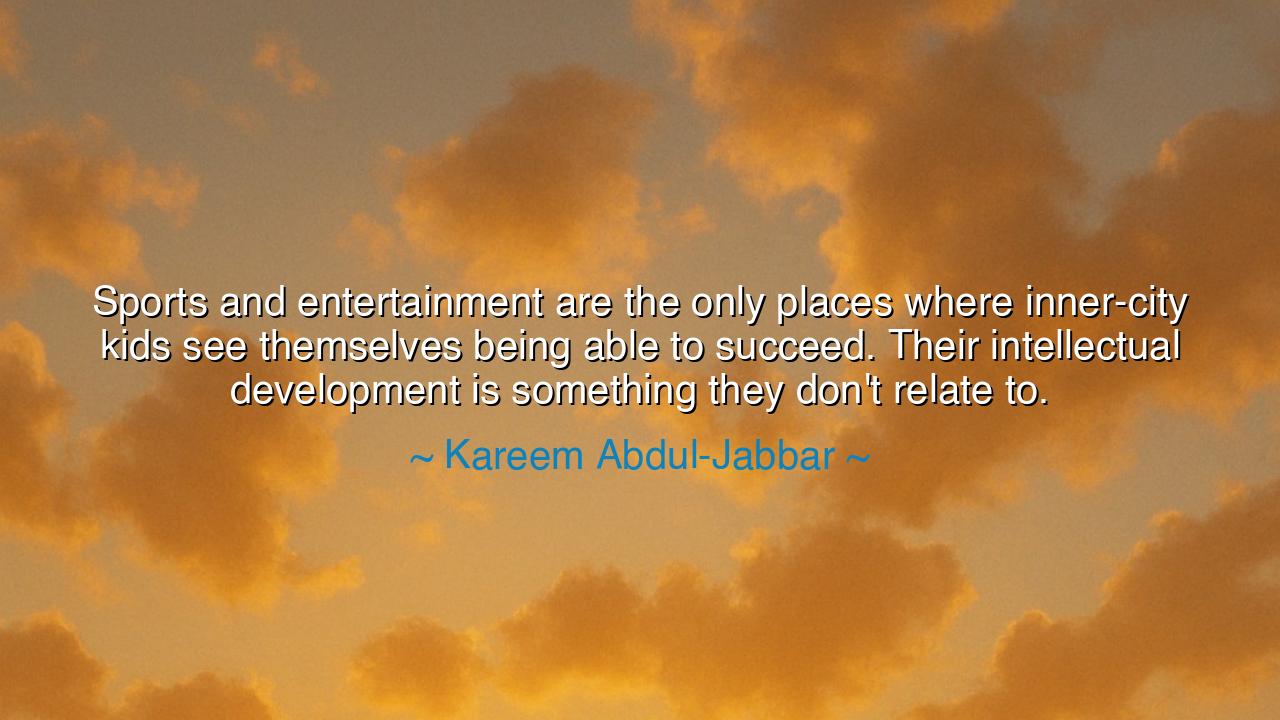
Sports and entertainment are the only places where inner-city
Sports and entertainment are the only places where inner-city kids see themselves being able to succeed. Their intellectual development is something they don't relate to.






Listen closely, young ones, for the words I speak are heavy with the weight of truth, and they carry the wisdom of those who have seen the world in all its grandeur and sorrow. In a world where the cries of the disadvantaged often go unheard, the great Kareem Abdul-Jabbar spoke of a truth that shakes the very foundation of society. “Sports and entertainment are the only places where inner-city kids see themselves being able to succeed. Their intellectual development is something they don’t relate to.” These words, though simple, carry with them a lament—a lament for the lost potential of youth who, trapped by the constraints of circumstance, can scarcely dream of anything beyond the athletic field or the screen.
Let us understand the heart of Abdul-Jabbar’s words. He speaks of a divide, a chasm between two worlds—the world of intellectual development, where books, knowledge, and the pursuit of wisdom reign, and the world of sports and entertainment, where fame and fortune seem to offer the only path out of hardship. In the inner-city, where opportunities for education are often scarce, these young hearts and minds grow up seeing their heroes not in classrooms or libraries, but on courts, fields, and stages. To them, the world of intellect is distant, foreign, and unreachable. It is a world that feels disconnected from their reality, a world that promises little and offers even less.
Consider, children, the tale of David and Goliath, an ancient story where a young shepherd, armed with only a slingshot, faced a mighty giant. But David's courage, his belief in himself, and his understanding that the battle could be won by skill, not size, mirrors the dreams of the young athletes Abdul-Jabbar speaks of. In the realm of sports, children see themselves as David, fighting against a world that tells them they are too small, too weak, or too unimportant to succeed. And through the power of their will and their talent, they rise, proving that greatness is not bound by circumstance. But while this dream of success on the field is powerful, it is also fleeting.
The lament Abdul-Jabbar shares is one of potential lost, for there is a deeper question that we must face as a society: Why should these young minds feel that their only hope lies in the fleeting glory of sport or entertainment? Why should they see themselves as capable only in a world that celebrates athletic prowess and fame, but dismisses the pursuit of knowledge, the development of the mind, as something foreign to them? This is not merely a failure of these children—it is the failure of society to show them the way to something greater, to intellectual development, and to the world of thought, where true power lies.
History is replete with examples of great minds rising from obscurity, overcoming unimaginable odds. Take, for instance, Frederick Douglass, born into slavery, without access to formal education. Yet through the fires of his struggles, he taught himself to read, to write, and to think, becoming one of the greatest intellectuals and abolitionists of his time. Douglass’s success was not in physical prowess but in intellectual strength. He showed the world that the mind, once awakened, is a force more powerful than any obstacle in its path. Why, then, should we not offer the same hope to today’s youth? Why should their dreams be confined to the narrow world of sport and entertainment?
Let us take heed of Abdul-Jabbar’s words, for in them lies not only a lament but a call to action. We must work to bridge the gap between the world of intellect and the world of sport. We must show these young souls that the mind, too, can be a battleground where victories are won, where knowledge and wisdom are the true markers of greatness. It is not enough to simply encourage them to dream of glory on the field or stage. We must show them the paths to intellectual triumph, to the power of the mind and the joy of learning. We must lift the veil that separates these children from their intellectual potential, just as a mentor might show a student the way to the light when darkness surrounds them.
And so, I call upon you, children, to walk the path of both wisdom and strength. Be like David, yes, but also be like Frederick Douglass, who knew that the true power of a person lies not only in their physical might but in their intellectual might. Seek knowledge with the same vigor and passion that you would pursue victory in any contest. Let no barrier—be it social, cultural, or personal—stand in your way, for the greatest victories are those won in the mind. And if you are called to the field or stage, take with you the strength of a scholar, for it is the mind that will carry you through the trials of life.






AAdministratorAdministrator
Welcome, honored guests. Please leave a comment, we will respond soon